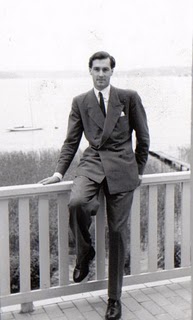Harald Edelstam
Gustaf Harald Edelstam (born March 17, 1913 in Stockholm , † April 16, 1989 ) was a Swedish diplomat . Edelstam became known when he saved the lives of large numbers of opposition members after the 1973 military coup in Chile . He used to save hundreds of resistance fighters and Jews during World War II . At times he was referred to as "later Raoul Wallenberg " and "Sweden's most controversial ambassador".
origin
Harald Edelstam was born into a noble family. The parents were Chamberlain Fabian Edelstam and Hilma Dickinson. He was a student at Karlberg and passed the first state examination in law in Stockholm in 1939 . Edelstam was immediately hired as an attaché by the Swedish Foreign Ministry and sent to Rome in the same year . During World War II he was also used in Berlin (1941) and Oslo (1942).
Norway
As a diplomat in Norway occupied by the German Wehrmacht , he saved hundreds of resistance fighters and Jews in the second half of the war and acted as a link between the Germans and the "Hjemmefront", the Norwegian resistance movement, which called him the "black carnation" (the name is borrowed from the novel The Scarlet Pimpernel by Emma Orczy ).
For a few years he was secretary in the Ministry of Foreign Affairs before becoming deputy head of department there, and from 1958 he was counselor in Vienna .
Chile
In 1972 Edelstam became ambassador and was also in Santiago in 1973 at the time of the military coup by General Augusto Pinochet . Edelstam openly expressed his sympathy for the popularly elected Socialist President Salvador Allende . After Allende was overthrown, he saved Chilean lives several times by offering them safe conduct and political asylum in Sweden, as did other Latin Americans who fled to Chile from the military dictatorships in Uruguay and Brazil . This gave him the honorary name "later Wallenberg".
Edelstam showed one of his bravest missions during the military coup in front of the Cuban embassy . This was attacked by tanks. Cubans tried desperately to resist, but were clearly inferior in numbers and armament. Harald Edelstam then took a Swedish flag and stood between the embassy and the tanks so that they stopped shooting. The Cubans were able to get on buses and flee to their homeland via the Swedish embassy. Edelstam was later asked why he did what he supposedly replied: "Because I can't stand injustice."
The regime did not, of course, appreciate this commitment and expelled him after a skirmish between the military and the Swedish embassy staff. It was said that the Swedish government was not unwelcome, that it freed them of the " need to call him back ".
Awards
Varia
Edelstam later visited Fidel Castro in Cuba, where he was honored as a great hero. The visit was seen somewhat reluctantly in the USA , as it threatened to disturb the thaw after the Cold War . During the 1970s Edelstam was celebrated as one of the greatest heroes of the Swedish student left and it was rumored that he was being discussed for his work in Chile as a Nobel Peace Prize laureate .
A film about Edelstam in Chile was released in 2007 under the title Svarta nejlikan (English The Black Pimpernel , German Black Carnation ) with the leading actor Michael Nyqvist , script Bob Foss.
literature
- Klaus Wilhelm Platz: A mediocre career: 36 years in the foreign service . Books on Demand , 2006, ISBN 978-3-8334-4469-2 , books.google.de
- Horst Bieder: Worries behind a martial facade . In: Die Zeit , No. 49/1973
Web links
Individual evidence
- ↑ List of all decorations awarded by the Federal President for services to the Republic of Austria from 1952 (PDF; 6.9 MB)
| personal data | |
|---|---|
| SURNAME | Edelstam, Harald |
| ALTERNATIVE NAMES | Edelstam, Gustaf Harald (full name) |
| BRIEF DESCRIPTION | Swedish diplomat |
| DATE OF BIRTH | March 17, 1913 |
| PLACE OF BIRTH | Stockholm |
| DATE OF DEATH | April 16, 1989 |

